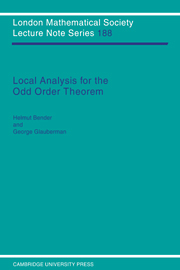Book contents
- Frontmatter
- Contents
- Preface
- Chapter I Preliminary Results
- Chapter II The Uniqueness Theorem
- Chapter III Maximal Subgroups
- Chapter IV The Family of All Maximal Subgroups of G
- Appendix A Prerequisites and p-Stability
- Appendix B The Puig Subgroup
- Appendix C The Final Contradiction
- Appendix D CN-Groups of Odd Order
- Appendix E Further Results of Feit and Thompson
- Bibliography
- List of Symbols
- Index
Preface
Published online by Cambridge University Press: 04 May 2010
- Frontmatter
- Contents
- Preface
- Chapter I Preliminary Results
- Chapter II The Uniqueness Theorem
- Chapter III Maximal Subgroups
- Chapter IV The Family of All Maximal Subgroups of G
- Appendix A Prerequisites and p-Stability
- Appendix B The Puig Subgroup
- Appendix C The Final Contradiction
- Appendix D CN-Groups of Odd Order
- Appendix E Further Results of Feit and Thompson
- Bibliography
- List of Symbols
- Index
Summary
About 30 years ago, Walter Feit and John G. Thompson [8] proved the Odd Order Theorem, which states that all finite groups of odd order are solvable. In the words of Daniel Gorenstein [15, p. 14], “it is not possible to overemphasize the importance of the Feit-Thompson Theorem for simple group theory.” Their proof consists of a set of preliminary results followed by three parts-local analysis, characters, and generators and relations- corresponding to Chapters IV, V, and VI of their paper (denoted by FT here). Local analysis of a finite group G means the study of the structure of, and the interaction between, the centralizers and normalizers of nonidentity p-subgroups of G. Here Sylow's Theorem is the first main tool. The main purpose of this book is to present a new version of the local analysis of a minimal counterexample G to the Feit-Thompson Theorem, that is, of Chapter IV and its preliminaries. We also include a remarkably short and elegant revision of Chapter VI by Thomas Peterfalvi in Appendix C.
What we would ideally like to prove, but cannot, is that each maximal subgroup M of G has a nonidentity proper normal subgroup M0 such that
(1) CM0(α) = 1, for all elements α ∈ M − M0,
(2) for all elements g ∈ G ∈ M,
(3) M0 is nilpotent,
(4) M/M0 is cyclic,
and such that the totality of these subgroups M0, with M ranging over all of the maximal subgroups of G, forms a partition of G:
(5) each nonidentity element of G lies in exactly one of the subgroups M0.
- Type
- Chapter
- Information
- Local Analysis for the Odd Order Theorem , pp. ix - xiiPublisher: Cambridge University PressPrint publication year: 1995

